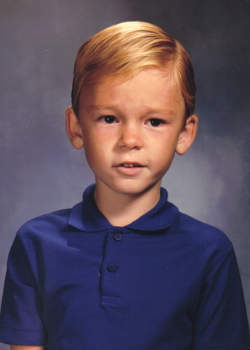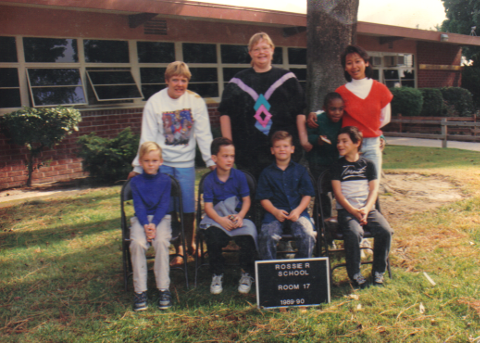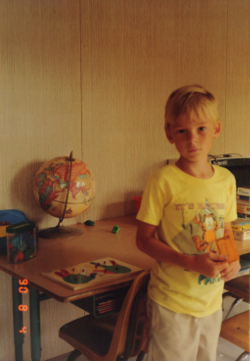
1.0 - IDENTIFYING INFORMATION
Michael Haley is a seven year, eight month old first grader. He entered Rossier School in May of 1989, under SED classification. He has a history of noncompliance, aggression and low impulse control. He is currently awaiting evaluation by L.A. Diagnostic Center. He works best in a highly structured environment.
2.0 - ACADEMIC
SPELLING: Michael is working on a Kindergarten level in spelling. He can use his decoding skills to determine if a picture begins with a certain letter, however, when he is decoding words, he is not consistent. He is having some difficulties with following a left to right progression and from top to bottom.
GENERAL INFORMATION: Michael is very curious about his world and why things happen the way that they do. He wants to know how things work. When he learns something, he often tries to apply the knowledge in other ways. Michael knows his name and most of his address. He can recite the Pledge of Allegiance.
 3.0 - SOCIAL/EMOTIONAL
3.0 - SOCIAL/EMOTIONAL
3.1 - Internal Dynamics
Michael is a anxious child who approaches most situations in a guarded, tentative manner. He experiences low levels of self-esteem and easily feels threatened by demanding or new stimuli in his environment. When threatened, he withdraws into a fantasy world in order to defend against the difficulties that he is facing. If he is exposed to these difficult situations for a longer period of time, he will seek out an available adult to assist him with the problems and repeatedly asks them questions as to why the situation occurred. Michael attempts to address conflictual/difficult situations in an assertive manner 20% of the time. He appropriately seeks assistance to resolve conflicts 45% of the time. He engages in repetitive behaviors (i.e., wringing his hands and/or rocking) when he encounters anxious situations 85% of the time.
3.2 - Interpersonal Development
3.2.1 - Peer Relations
Due to his lack of socialization skills, Michael has not constructed a peer relationship that has lasted over a period of days. He tends to prefer isolative activities and will withdraw from others during group activities. Generally, Michael engages in parallel play. When he attempts to incorporate others into his play, he tends to direct them rather than establish a relationship with them. When his peers do not follow his directions, he becomes angry and tearful. Michael tends to express his anger in passive-aggressive ways, such as teasing them or disrupting their activities. Presently, Michael is able to interact with one peer in a structured activity for ten minutes. He utilizes pro-social skills to initiate contact with his peers 40% of the time.

3.2.2 - Adult Relations
Michael is hesitant to directly approach adults. He will agitate his peers to secure adult attention or address the adult by spelling their name. When he does receive the attention that he is seeking, he becomes visibly anxious and there is an increase in impulsive behaviors. When confronted with behavioral limits, Michael will attempt to manipulate or circumvent the directions. At the present time, Michael utilizes age appropriate, pro-social behaviors to gain adult attention 55% of the time. He follows directions after one verbal prompt 65% of the time. He establishes and maintains eye contact when talking with an adult 60% of the time.
 In January of 1991, I began attending the Diagnostic School in Los Angeles, and thus, the Rossier School chapter came to a close. I still vaguely recall storming out of the principal's office when the final decision was made. I felt as if I had not done anything to deserve the transfer. I never took French in school, but this seems adequate: C'est la vie.
In January of 1991, I began attending the Diagnostic School in Los Angeles, and thus, the Rossier School chapter came to a close. I still vaguely recall storming out of the principal's office when the final decision was made. I felt as if I had not done anything to deserve the transfer. I never took French in school, but this seems adequate: C'est la vie.
No comments:
Post a Comment